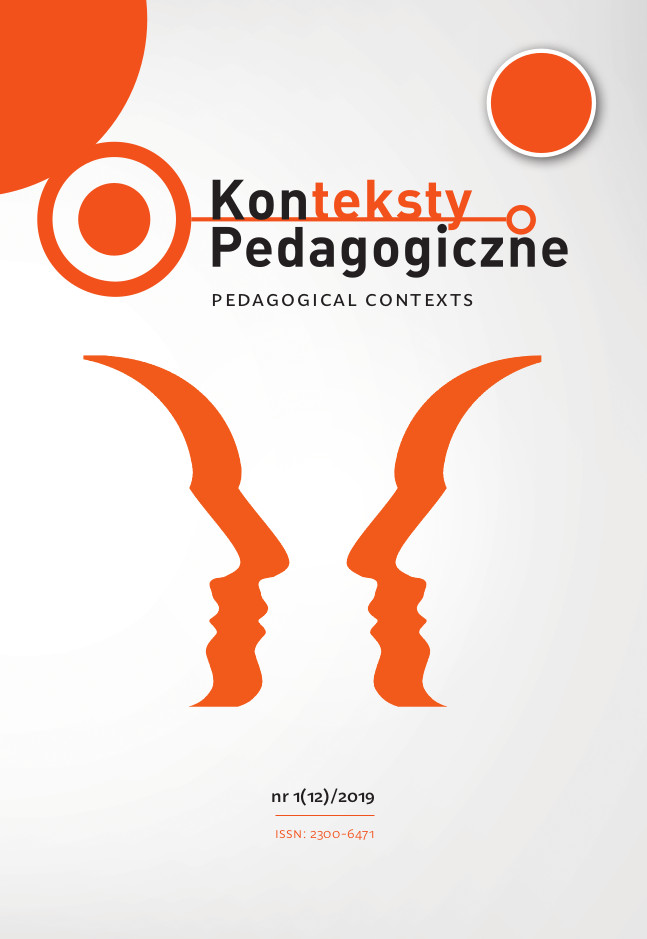Abstract
The article presents the social and educational situ- ation of Burundian children with psychological and physical disabilities. The aim of the presented research is to answer the question of what features dominate in the perception of intelligent people by Burundian children and to look at how the social and educational status of children with disabili- ties is positioned in this context. The results of the research carried out among Burundian youth from the Integrated Primary School in Bujumbura and among social activists working in the environment of children with disabilities and at risk of social exclusion were subject to qualitative analysis. The analysis of the research showed that there are four main characteristics that the pupils describe as intelligent: serious, hard-working, brave and polite.
References
Aronson, E. (2009). Człowiek – istota społeczna [The Social Animal], transl. J. Radzicki. Warszawa: PWN.
Babbie, E. (2008). The basics of social research. Belmont CA: Thomson/Wadsworth.
Devlieger, P. & Nieme, L. (2011). Handicap et société africaine [Disability and African Society]. Paris: L’Harmattan.
Gardner, H. (2002). Inteligencje wielorakie. Teoria w praktyce [Multiple Intelligences: The Theory in Practice], transl. A Jankowski. Poznań: Media Rodzina.
Hofstede, G. (1997). Cultures and Organizations. Software of the Mind. New York: McGraw-Hill.
Janus, B. (2013). Poznawcze i społeczne funkcjonowanie dzieci z niepełnosprawnościami w Burundi [The Cognitive and Social Funding of Children with Disabilities in Bu¬rundi]. Unpublished Master’s thesis. Kraków: archiwum Instytutu Psychologii Stosowanej UJ.
Kłoskowska, A. (1980). Kultura masowa [Mass Culture]. Warszawa: PWN.
Konecki, K. (2000). Studia z metodologii badań jakościowych. Teoria ugruntowana [Studies in Methodology of Qualitative Research. Grounded Theory]. Warszawa: PWN.
Kopik, A. (2016). Inteligencje wielorakie – wachlarz możliwości dziecka [Multiple intelligences – a range of child’s possibilities]. Konteksty Pedagogiczne, 2(7), 15–25.
Kowalik, S. (2007). Psychologia rehabilitacji [Rehabilitation Psychology]. Warszawa: Wydawnictwa Akademickie i Profesjonalne.
Kwiatkowska, A. (2014). Problemy metodologiczne w badaniach międzykulturowych i kulturowych [Methodological problems in intercultural and cultural research]. Psychologia Społeczna, 9(28), 8–27.
Lamczak, U. (2001). Co to jest inteligencja emocjonalna? [What is emotional intel¬ligence?]. Edukacja i Dialog, 5, 41–47.
Larousse. Słownik francusko-polski [Larousse. French-Polish Dictionary]. Warszawa: Wydawnictwo Rea.
Leung, K. & Vijver van de, F.J. (2000). Methodological issues in psychological research on culture. Journal of Cross-Cultural Psychology, 31, 33–51.
Majcherek, J.A. (1995). Relatywizm kulturowy – uwarunkowania i konsekwencje pewnej doktryny [The Cultural Relativism – Conditions and Consequences of a Certain Doctrine]. Kraków: Wydawnictwo Naukowe WSP.
Masuda, T. & Nisbett, R. (2001). Attending holistically versus analytically: Comparing the context sensitivity of Japanese and Americans. Journal of Personality and Social Psychology, 81, 922–934.
Moskowitz, G. (2009). Zrozumieć siebie i innych. Psychologia poznania społecznego [Social Cognition: Understanding Self and Others]. Gdańsk: GWP.
Nęcka, E. (1994). Inteligencja i procesy poznawcze [Intelligence and Cognitive Processes]. Kraków: Oficyna Wydawnicza Impuls.
Nieme, L. (2011). La conception du handicap et la pastorale des sourds [The conception of disability and the pastoral care of the deaf ]. In: P. Devlieger & L. Nieme, Handicap et société africaine [Disability and African Society] (pp. 69–80). Paris: L’Harmattan.
Nisbett, R. (2009). Geografia myślenia. Dlaczego ludzie Wschodu i Zachodu myślą inaczej [The Geography of Thought: How Asians and Westerners Think Differently and Why]. Sopot: Smak Słowa.
Peng, K. & Nisbett, R. (2000). Dialectical responses to questions about dialectical thinking. American Psychologist, 55, 1067–1068.
Piaget, J. (1966). Narodziny inteligencji dziecka [The Origins of Intelligence in Children], transl. M. Przetacznikowa. Warszawa: PWN.
Reber, A.S. (2000). Słownik psychologii [The Penguin Dictionary of Psychology], transl. B. Janasiewicz-Kruszyńska. Warszawa: Wydawnictwo Naukowe Scholar.
Strelau, J. (2000). Psychologia. Podręcznik akademicki [Psychology. Academic Textbook], vol. 2. Gdańsk: GWP.
Strelau, J. (2002). Psychologia różnic indywidualnych [The Psychology of Individual Dif¬ferences]. Warszawa: Wydawnictwo Naukowe Scholar.
Superson, B. (2017a). Działania wspierające proces edukacji i kompleksowej reha¬bilitacji osób z różnymi typami niepełnosprawności w Burundi (Afryka Wschod¬nia) [Measures to support education and comprehensive rehabilitation of peo¬ple with various disabilities in Burundi (East Africa)]. In: G. Gunia, A. Ochman & M. Trojańska (eds.), Teoria i praktyka oddziaływań profilaktyczno-wspierających rozwój osób z niepełnosprawnością [Theory and practice of preventive and supportive actions for the development of people with disabilities], vol. 4.1 (pp. 205–217). Kraków: Wydawnictwo Naukowe Uniwersytetu Pedagogicznego.
Superson, B. (2017b). Rola inteligencji cielesno-kinestetycznej w procesie edukacji dzieci niepełnosprawnych oraz zagrożonych wykluczeniem społecznym w Burundi [The role of physical and physiotherapeutic intelligence in the education of children with disabilities and those at risk of social exclusion in Burundi]. In: I. Sikorska, K. Gerc & L. Pawłowski (eds.), Sportowcy z niepełnosprawnością: aspekty psychologiczne i społeczne [Athletes with Disabilities: Psychological and Social Aspects] (pp. 83–94). Kraków: Oficyna Wydawnicza AFM.
Szustrowa, T. & Jaworowska, A. (1992). Podręcznik do testu matryc Ravena [A Manual for Raven’s Progressive Matrices]. Warszawa: Pracownia Testów Psychologicznych Polskiego Towarzystwa Psychologicznego.
Wrzesińska, A. (2005). Mwana znaczy dziecko. Z afrykańskich tradycji edukacyjnych [Mwana Means a Child. From African Educational Traditions]. Warszawa: DIALOG.
In accordance with the recommendation of the Ministry of Science and Higher Education, which aims to counteract the practice of “ghostwriting” and “guest authorship,” all authors submitting their text for publication should attach an author’s statement which declares the contribution of each of the authors to the article. The printed and signed statement should be delivered by mail or other means to editor-in-chief Joanna Skibska or sent in the form of a scan to the following e-mail address: redakcja@kontekstypedagogczne.pl. The authors will not receive remuneration for publishing their papers. The editors reserve the right to make minor editorial changes to the articles which will not affect the substance of the article. We encourage all authors to prepare their articles in accordance with the guidelines for manuscript preparation. Download pdf file.
Authors transfer all copyrights and grant the journal the right of first publication with the work simultaneously licensed under a Creative Commons Attribution License that allows others to share the work with acknowledgement of the work's authorship and initial publication in this journal. All authors agree to the publishing of their email addresses, affiliations and short bio statements with their articles during the submission process.

